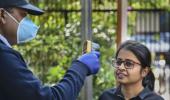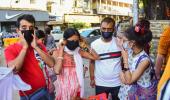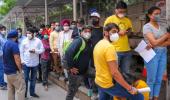'Healthcare workers treating coronavirus have been among the hardest hit.'
'It is scary, but this is what we signed up for and became doctors.'
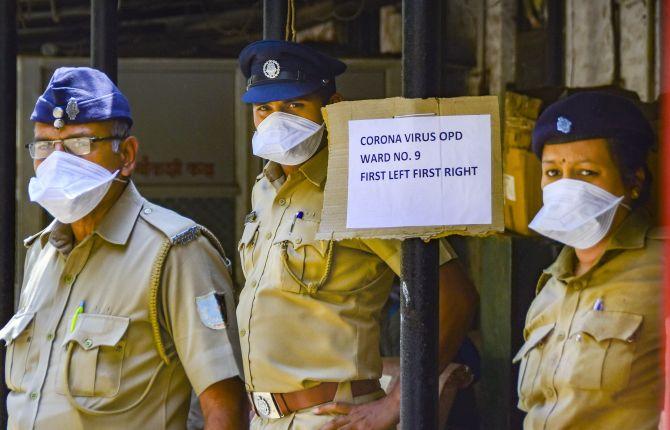
"A lot of doctors in India are old and have pre-existing illnesses themselves... Keeping that in mind, should we expose our elderly doctors with pre-existing illnesses? Or should we tell them to keep away and bring young doctors who have very little experience? All these are very hard decisions," physician Dr Swapneil Parikh, co-author of The Coronavirus: What You Need To Know About The Global Pandemic, which releases on April 1, tells Archana Masih/Rediff.com in the concluding part of the interview.
What can healthcare workers in India learn from their Wuhan healthcare compatriots?
Some top doctors have said that Indians are strong and imply that we will tide over this, but the right message needs to go out that this is a serious crisis and we have to get our act together.
Doctors need to be ready for very hard times ahead. Colleagues in US and Italy say they are dealing with a war-like scenario. Italy has reached a point where doctors have to make a choice about which patients have a chance of surviving and which will we let die.
My worry is that we are going to get to that point soon because we don't have enough resources.
We also have to understand that a lot of doctors in India are old and have diseases themselves. Our buffer stock of protective equipment is very limited, we will be out of stock soon.
Keeping that in mind, should we expose our elderly doctors with prevailing illnesses? Or should we tell them to keep away and bring young doctors who have very little experience? All these are very hard decisions.
The conservative estimate is that between 20% to 60% of all adults are going to be infected -- so if we use up our stock right now, then we will reach a stage when we will not have any masks left for later.
If healthcare workers start getting sick when the pandemic is peaking, it will be a huge crisis.
We need to take very thoughtful and strategic decisions.
How does a 14 day quarantine of those coming from affected countries according to the government's list of those countries help in reducing infection?
If you have come from a country with a high number of cases, then people must self-isolate for 14 days. There is a guideline by the government about how to do that and not infect others staying with you.
But that is not enough, we have passed the point when we can contain it from the outside. Containment from the outside is not going to save people from getting infected. It is about flattening the curve.
Let me explain the concept of R0, which means how many people at an average will an infected person infect. On an average, for Covid, each infected person infects 2 to 3 people -- it means that it is going to propagate exponentially.
You can't stop that growth, you can slow it until a sizeable chunk of the population becomes immune.
Some researchers in Britain are talking about herd immunity. What is that?
Herd immunity is a concept based in vaccination. When a certain number of people have developed immunity to the infection it then disrupts transmission.
What the UK is betting on is that let young people get infected now because then they will have immunity and will disrupt transmission later.
They feel they can manage the old people who get sick, but if they let everyone get sick later it will disrupt their healthcare system.
But this is a gamble. There is no evidence to show that this is going to happen. Experts have strongly condemned this strategy and in fact UK has thankfully backtracked.
We know what has worked in China, South Korea, Japan -- the reason the UK is mulling this option is because no free people will accept the conditions imposed in China. Countries have gone to war for far less freedom.
The UK, the USA, Europe and India won't accept that kind of strict conditions. Tomorrow, if the government says everyone stay at home, many will starve.
There has to be a universal basic income programme to compensate for the loss of wages, but more importantly there is so much distrust in the government in some communities.
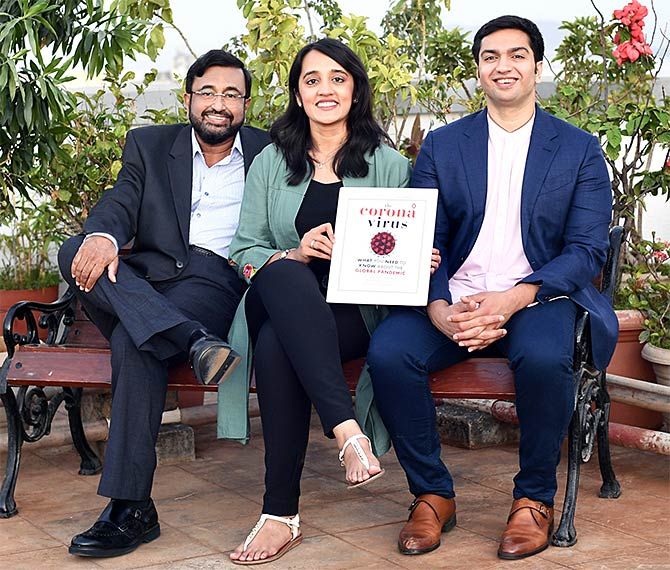
As the temperature rises, will this virus become less menacing?
No one can predict the weather and the response to the weather. It is a new virus, so we don't know whether it may happen or not.
The influenza virus cases in temperate climes like the US and Kashmir spike in winter and reduce in summer. The human body temperature is just below 37 degree centigrade, in a fever it can go up to 40 and sometimes above 40.
In winter, the contact process changes because people cluster indoors while in the summer people are outdoors.
While in tropical areas like Mumbai, influenza spikes in the monsoon.
In case it behaves like an influenza virus, then the cases should decrease. This study applies to seasonal viruses where there is a herd immunity, but when there is a pandemic strain, no one has immunity so the risk of infection is high.
Dengue, influenza, malaria cases spike during the monsoon in Mumbai. There are not enough ICU beds and people die without ICU care of those diseases right now, so what are we going to do even if Covid-19 drops by then?
There may be a drop in the rate of new infections. The graph may slow down, but it is still going upwards.
Instead of 100 new infections per day you may have 50 infections a day, but the total number is still increasing while the ICU beds remain the same -- so every new case in that scenario is a new patient you will find hard to treat.
What are some of the do's and don'ts?
Individually, wash you hands with soap and water frequently for 20 to 40 seconds.
Think of the virus as a little bit of fat surrounding a core. Like if you have butter or ghee on your hands and it dissolves when you wash your hand with soap and water.
Soap destroys the fat layer of the virus and it gets destroyed. If you are going to touch your face, at least wash your hands first.
Second, avoid touching your face.
You must cough into a tissue and throw it away in a closed bin. The other practical way is to cough into the fold of your elbow because the inside of your elbow is not going to touch anything.
Try and be one metre away from everyone if possible. If someone is sick, then at least two metres away.
Collectively, I would like to formulate a plan which has a network of medical workers connect with patients through telemedicine and guide them.
Each one will be assigned to a community area and guide them like say, in a chawl or a slum.
A building society will make action committees, the action committee will segregate the society into green and red zones with a buffer zone in between.
Infected people will go in red zones where people will have to share houses, you can't provide separate rooms in India because many homes don't have more than a room and a bathroom.
The buffer zone will be a team of action members who need to be young, technology savvy, disease free and non smokers. They have to be segregated into red and green zone workers, red zone workers will work with only sick people.
In the green zone we will need to put all the most vulnerable people -- elderly, diabetic, heart and lung disease patients. India is a world leader in diabetes and heart disease.
You have to think of radical social reorganisation strategies.
The underplayed projection is 1.5 million ICU admissions over the next 12 to 18 months, while we have only about 100,000 ICU beds.
There is no way we can scale that up so quickly and even if we do, we don't have enough doctors and nurses and equipment.
In India even for the diseases besides Covid-19, we have a shortage. Even if Covid-19 decreases by 90%, the remaining 10% will fill up all the beds and people will start dying of dengue, malaria, typhoid and monsoon related diseases.
A collapse of societal infrastructure becomes the breeding ground for other diseases.
What are conversations young doctors like you and healthcare workers as they deal with this pandemic?
Healthcare workers treating coronavirus have been among the hardest hit. It is scary, but this is what we signed up for and became doctors.
Even doctors get scared and nurses cry.
